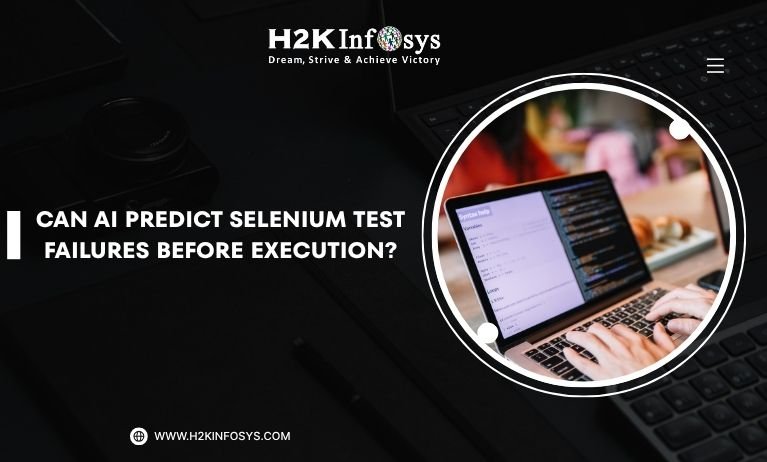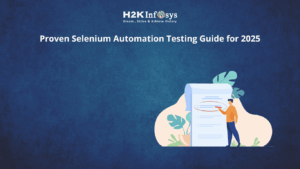The Rise of AI in Selenium Testing
Imagine knowing which of your Selenium tests will fail even before running them. Sounds futuristic? Not anymore. With the rise of Artificial Intelligence (AI) and Machine Learning (ML), predictive analytics has entered the world of software testing helping QA engineers identify potential test case failures before execution.
As organizations push for faster releases and flawless user experiences, AI-driven testing solutions are transforming how automation engineers work. This article explores how AI Predict Selenium test failures ahead of time, why it’s a game changer, and how professionals can learn these cutting-edge techniques through a Selenium certification course or Selenium course online from H2K Infosys.
Why Traditional Selenium Testing Faces Challenges

Selenium is one of the most powerful tools for web automation. However, as test suites grow, maintaining them becomes increasingly difficult. Here are some of the common pain points QA teams encounter:
- Flaky tests: Tests that fail intermittently without any change in the codebase.
- Environment issues: Browser updates, network lags, or system differences cause test failures.
- Script maintenance: Frequent UI changes require constant test script updates.
- Time constraints: Running thousands of test cases consumes hours or even days.
Even with efficient CI/CD pipelines, predicting test reliability before execution remains a challenge. That’s where AI Predict Selenium solutions come in.
How AI Predicts Selenium Test Failures Before Execution
AI is transforming the way software testing teams approach automation. Traditionally, QA engineers could only analyze test failures after execution. But today, AI Predicts Selenium test failures in advance by studying patterns from historical data, analyzing code changes, and interpreting log files with precision. Using powerful machine learning models, AI Predicts Selenium outcomes by identifying test cases most likely to fail, even before the scripts run. This proactive approach helps engineers focus on stable tests, saving hours of execution time. With every new cycle, AI Predicts Selenium results become more accurate, creating a smarter, self-learning testing process.
Historical Data Analysis
AI systems in test automation continuously learn from historical data to enhance accuracy. By analyzing previous test results such as which scripts failed, how often they failed, and under what conditions AI Predict Selenium models can recognize hidden patterns. These AI Predict Selenium insights help anticipate potential failures before they occur, allowing QA teams to focus on proactive debugging and smarter automation strategies. With AI Predict Selenium, testing becomes not just reactive but intelligent and data-driven.
For example:
- A particular login test script fails frequently on Chrome after certain UI changes.
- AI detects this pattern and flags it as high-risk before the next test run.
This helps testers focus only on stable test cases, improving efficiency and reducing redundant executions.
Code Change Impact Prediction
Machine learning models can analyze the code commits or pull requests and predict which parts of the application might impact existing Selenium tests.
For instance:
If a developer modifies the “checkout” function, AI predicts which Selenium scripts related to that feature are likely to fail. It then prioritizes those tests in the next run, saving time and computing resources.
This process is often referred to as predictive test selection—a powerful AI-driven feature integrated into modern testing pipelines.
Natural Language Processing (NLP) for Log Analysis
AI models use NLP to parse through test logs, identify failure reasons, and detect similar patterns.
If multiple tests fail due to a timeout issue, the AI system can learn to recognize that signature and alert QA engineers before the next execution.
4. Test Stability Scoring
AI systems can assign a “stability score” to each test case. Tests with low stability scores are marked for review or rework. This helps QA teams decide which tests are reliable and which are likely to fail.
A simple scoring model may look like this:
| Test Case | Failure Rate | Flakiness | AI Stability Score |
|---|---|---|---|
| Login_Test | 0.85 | High | 45% |
| Search_Test | 0.10 | Low | 92% |
| Checkout_Test | 0.60 | Medium | 70% |
This table helps QA managers visualize which scripts need immediate attention before test execution.
AI Models Used to Predict Selenium Test Failures

AI Predict Selenium test failures using different ML models and techniques:
- Regression Models: Estimate the probability of a test failure based on prior data.
- Decision Trees: Classify test cases as “likely to pass” or “likely to fail.”
- Neural Networks: Detect complex relationships between UI changes, code commits, and failure patterns.
- Random Forest Models: Aggregate multiple decision trees for more accurate predictions.
Example: Random Forest for Test Failure Prediction
Here’s a simplified Python snippet showing how machine learning could be applied:
from sklearn.ensemble import RandomForestClassifier
from sklearn.model_selection import train_test_split
from sklearn.metrics import accuracy_score
# Sample data: past test runs (1 = failed, 0 = passed)
data = [[0.8, 0.4, 0.6], [0.2, 0.1, 0.3], [0.9, 0.7, 0.8], [0.1, 0.2, 0.1]]
labels = [1, 0, 1, 0] # 1 = fail, 0 = pass
# Train model
X_train, X_test, y_train, y_test = train_test_split(data, labels, test_size=0.25)
model = RandomForestClassifier(n_estimators=100)
model.fit(X_train, y_train)
# Predict future test outcomes
predictions = model.predict(X_test)
print("Prediction Accuracy:", accuracy_score(y_test, predictions))
This approach demonstrates how AI learns from past executions to predict potential Selenium test failures before execution.
Real-World Example: Predictive Testing in Action
Case Study: Large E-commerce Platform
A leading e-commerce company integrated AI Predict Selenium capabilities into their CI/CD pipeline. Before implementing AI, their automated test suite (10,000+ scripts) took nearly 8 hours to execute.
After integrating AI-based predictive analysis:
- The system predicted 28% of tests that were likely to fail.
- QA teams focused only on the remaining 72%, cutting execution time to 3 hours.
- Post-execution verification showed that 95% of AI’s failure predictions were accurate.
This resulted in a 60% faster release cycle and fewer false positives, proving how AI can enhance Selenium test efficiency dramatically.
Benefits of Using AI to Predict Selenium Test Failures
Reduced Testing Time
AI identifies risky test cases early, helping teams skip redundant ones. This reduces execution time significantly.
Improved Test Reliability
By identifying flaky or unstable tests, AI improves the overall reliability of Selenium automation suites.
Lower Maintenance Costs
Predictive insights mean fewer reruns and less debugging, saving both time and money.
Smarter Test Planning
QA managers can use AI insights to plan regression cycles more effectively, prioritizing critical features.
Enhanced CI/CD Integration
AI models integrate seamlessly with Jenkins, GitHub Actions, and Azure DevOps to optimize continuous testing workflows.
Tools and Frameworks Supporting AI-Powered Selenium Testing
Here are some AI-based tools that enhance Selenium testing capabilities:
| Tool | Description | AI Feature |
|---|---|---|
| Testim.io | AI-driven test creation and maintenance | Self-healing locators |
| Applitools Eyes | Visual AI for UI testing | AI-based visual validation |
| Mabl | Low-code testing platform | Predictive test analytics |
| Functionize | AI for intelligent test execution | NLP-based test scripting |
| LambdaTest AI Analytics | Cloud testing with predictive insights | AI-based failure analysis |
These tools demonstrate how AI Predict Selenium test failures by learning from test history and improving outcomes over time.
How Test Engineers Can Adopt AI in Selenium Testing

Step 1: Start Small with Data Collection
Gather historical test data, logs, and results. This serves as the foundation for predictive models.
Step 2: Integrate AI Tools
Leverage AI-driven test management tools like Mabl or Testim for predictive insights.
Step 3: Apply Machine Learning Models
Use open-source libraries such as Scikit-learn or TensorFlow to build predictive models that analyze failure trends.
Step 4: Collaborate Across Teams
Encourage collaboration between developers, QA analysts, and data scientists for better model accuracy.
Step 5: Upskill with AI-Focused Selenium Training
Professionals can learn how AI Predict Selenium failures through a structured Selenium certification course or a Selenium course online from H2K Infosys.
The Future of Predictive Testing in Selenium
As AI technologies evolve, AI Predict Selenium will transform predictive testing from a simple enhancement into an absolute necessity. With AI Predict Selenium, testing teams can anticipate failures before they occur, optimize scripts based on real-time insights, and ensure higher software reliability. The future of automation lies in systems like AI Predict Selenium, where intelligence, accuracy, and efficiency work together to redefine how QA testing is performed.
Future systems will not only predict failures but also self-correct flaky scripts, auto-generate locators, and repair broken test flows in real time.
With continuous AI learning, Selenium automation will soon become self-sustaining, ensuring smarter, faster, and more resilient software testing cycles.
Key Takeaways
- AI Predict Selenium failures by learning from historical data and identifying test instability patterns.
- Predictive models improve efficiency by focusing on likely-to-pass test cases.
- Integrating AI into Selenium pipelines reduces maintenance costs and accelerates delivery.
- Hands-on learning through a Selenium certification course helps professionals master these AI-driven testing techniques.
Conclusion
The future of Selenium automation lies in prediction and prevention. With AI, testers can foresee failures before execution, streamline workflows, and enhance accuracy across projects.
If you want to stay ahead in this evolving field, now is the time to enroll in the Selenium certification course or Selenium course online at H2K Infosys. Learn how AI can make your testing smarter, faster, and more predictive than ever before.

























